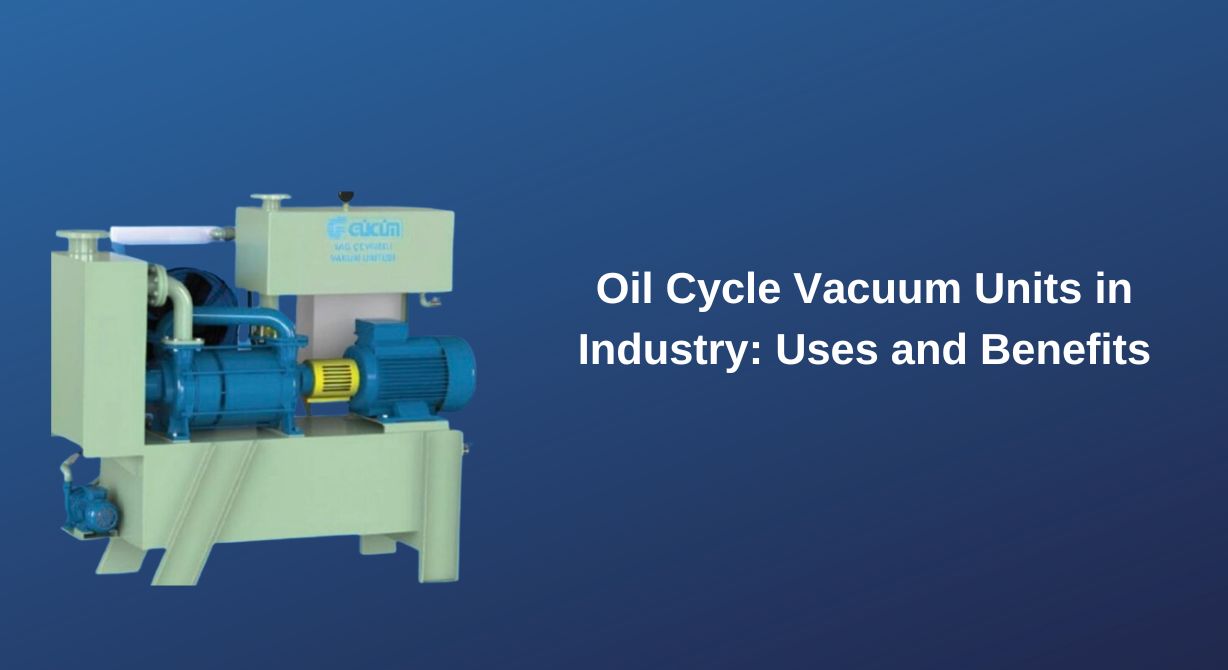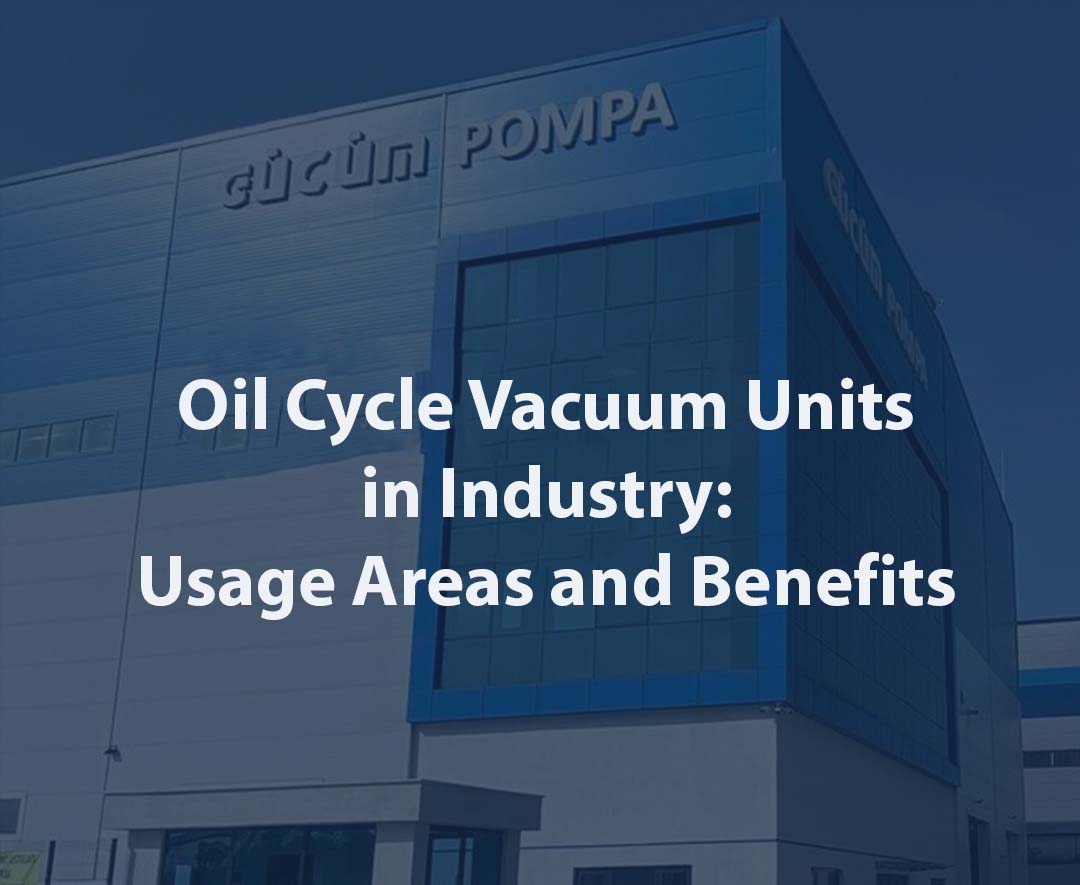Oil Cycle Vacuum Units in Industry: Uses and Benefits1
Contents
- Oil Cycle Vacuum Units in Industry: Usage Areas and Benefits
- Working Principle
- Areas of Use
- Benefits
- Energy Efficiency and Environmental Impacts
- Advantages of Oil Cycle Vacuum Units
- Maintenance and Durability
- Future in Industry
- Correct Selection Criteria
- Relationship between Performance and Efficiency
Oil Cycle Vacuum Units in Industry: Usage Areas and Benefits
Oil cycle vacuum units used in industry stand out especially in applications requiring high vacuum. These systems offer high efficiency through the use of oil and provide greater durability and longevity in industrial processes. Oil vacuum units can operate safely even in more challenging conditions because they have the capacity to provide strong and continuous vacuum. This long-term efficiency in industrial production reduces the operational costs of businesses and accelerates business processes.
Oil cycle vacuum units play a critical role in many industrial areas. High efficiency vacuum systems are needed in sectors such as plastic, rubber, food processing, pharmaceutical production, automotive and medical device production. Such systems are used in many applications, from packaging food products to sterilization. The performance of oil vacuum units makes them a preferred option in such harsh conditions. Their ability to withstand long-term operations allows them to perform their operations successfully even under high temperatures and intense workload.

Working Principle
Oil cycle vacuum units use mechanical pumps to expel air and gases and create a vacuum environment. This vacuum environment becomes more efficient thanks to the oil in the system. Oil reduces friction between pump components and allows the system to operate more efficiently. Oil increases the sealing capacity of the system and allows deeper vacuum levels to be achieved. Such systems are used especially in applications with high vacuum requirements.
Oil vacuum units can operate over a wide temperature range, making them very useful in the industrial field. Due to their operating principle, these systems have the ability to clean themselves over time and operate stably. This feature makes it possible to use them uninterruptedly for a very long time. The operating principle of oil cycle vacuum systems allows them to deliver high performance while keeping maintenance requirements to a minimum.
Areas of Use
Oil cycle vacuum units are widely used in the plastics industry, especially in injection molding processes. These units improve the shaping and processing processes of plastic materials by providing high vacuum levels. Likewise, these systems are used effectively in the automotive industry during the production and assembly of vehicle parts. Oil vacuum units are of great importance in vacuum packaging and sterilization processes in the food processing industry.
Oil cycle vacuum units are also preferred in sensitive areas such as medical devices and pharmaceutical production. These types of industrial systems are suitable for environments that require high sterility and hygiene. The use of these systems is also common in laboratory environments. Laboratory analyzers require oiled vacuum systems for sample preparation and analysis. As a result, these units can be used successfully in every sector with high vacuum requirements.
Benefits
One of the biggest benefits of oil cycle vacuum units is the high efficiency and low energy consumption they offer. The use of oil reduces the friction and wear of the system, allowing deeper vacuum levels to be achieved with less energy. In this way, businesses can save a lot of energy costs. Oil vacuum units can operate effectively even under harsh operating conditions because they are resistant to high temperature conditions.
Another important advantage of oil-based systems is their long life and durability. Oiled vacuum systems can be used longer because they generally show less wear. This significantly reduces maintenance and spare parts replacement costs. Oil cycle vacuum units offer an ideal option for businesses as they offer durability and long-term efficiency in industrial applications. In addition, such systems can operate uninterruptedly and efficiently in operating processes with low maintenance requirements.
Energy Efficiency and Environmental Impacts
Oil cycle vacuum units are very effective in providing energy efficiency. Oiled systems exhibit higher performance with less energy because they reduce friction and create an efficient vacuum. This saves energy in the long run and reduces energy costs for businesses. This energy efficiency of oil-based systems provides a more sustainable operation by reducing environmental impacts.
However, to minimize the environmental impact of oil vacuum systems, appropriate oil disposal and recycling systems must be used. Oil can be recycled and reused without harming the environment. Environmentally friendly management of oil cycle systems allows such systems to be more sustainable. The efficient operation of these systems enables businesses to achieve their sustainability goals while reducing environmental impact.
Advantages of Oil Cycle Vacuum Units
Oil cycle vacuum units offer many advantages in industrial applications. These units are known for their ability to reach high vacuum levels and continuous operation. The use of oil increases the efficiency of the system, providing lower energy consumption and higher vacuum power. Since lubricated systems show less wear and tear, maintenance requirements are also less.
Oil vacuum units are the ideal solution for long-term jobs. These systems, which reduce the energy costs of businesses by providing energy efficiency, also offer environmentally friendly solutions. The durability and long life of oil vacuum systems make them a highly preferred option in the industrial field. Low maintenance requirements reduce the operational costs of businesses and increase efficiency.
Maintenance and Durability
Oil cycle vacuum units are long-lasting and durable systems. The use of oil reduces friction between pump components, minimizing wear and ensuring the system lasts longer. Since oil-lubricated systems generally show less wear, the need for maintenance is also reduced. This significantly reduces maintenance costs for businesses. Maintenance processes for oil vacuum units are generally limited to oil change and filter cleaning.
The durability of oil cycle vacuum units can be increased with proper use and maintenance. Oil filtration and oil management increase the efficiency of the system and help ensure its longevity. The durable structure of such systems makes them suitable for use in heavy industry applications and harsh conditions. Their long-term operating capacity offers businesses an efficient and uninterrupted production process.
Future in Industry
Oil cycle vacuum units will have an important place in the future in the industry. With developing technology, the efficiency and durability of these units will further increase. In the future, it is expected to develop oil vacuum systems that consume less energy and are more environmentally friendly. With the effect of digitalization and automation, vacuum units will operate more efficiently and more manageable systems will emerge for users.
In the industrial sector, energy efficiency and environmental sustainability are becoming increasingly important. Therefore, oil vacuum units will continue to be preferred in the future as a solution that will enable businesses to operate both efficiently and environmentally friendly. Technological innovations will enable these systems to become smarter and offer greater efficiency. As a result, the importance of oil cycle vacuum units will continue to increase in the industrial field.
Correct Selection Criteria
There are some criteria to consider when choosing oil cycle vacuum units. First, vacuum levels and processing time play important roles in choosing the right system. The energy efficiency of the system is a factor that directly affects operating costs. When choosing, it is important to choose a model with capacity and performance levels that suit the needs of the business.
In addition, maintenance requirements are another factor to consider in the selection process. Oil vacuum units are known for their low maintenance, but each system's maintenance needs can be different. The durability of lubricated systems directly affects the efficiency and operating costs of the system in long-term use. The right choice allows businesses to have a more efficient and economical vacuum solution in the long run.
Relationship between Performance and Efficiency
The performance of oil cycle vacuum units is directly related to efficiency. The use of oil ensures efficient operation of the system, providing higher performance with less energy. This efficiency helps businesses reduce their costs. High-performance oil vacuum units can reach deeper vacuum levels, providing speed and efficiency in work processes.
The relationship between performance and efficiency determines the success of such systems in industrial processes. Oil vacuum units enable businesses to produce on-time and uninterrupted production, as they always show high performance. As a result, high performance and efficiency guarantee the sustainability and longevity of industrial systems. This allows businesses to operate efficiently for a long time with less maintenance and spare parts costs.
